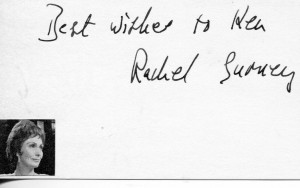.jpg)
Eric Shorter’s obituary in “The Guardian” in 2001:
Rachel Gurney, who has died aged 81, was one of the most elegant and serene exponents of well-bred femininity and aristocratic assurance on the postwar London stage and in television, in particular as the moneyed Belgravian matriarch, Lady Marjorie Bellamy, in the TV series Upstairs, Downstairs, which lightly examined the English class system.
On the stage, where her career spanned nearly half a century, Kenneth Tynan drew attention to her talent by attacking the West End management. After watching her 1956 performance in Enid Bagnold’s The Chalk Garden, which the Guardian critic Philip Hope-Wallace rated “an English rose of a comedy” and “the acme of perfect drawing-room acting”, Tynan wrote: “Rachel Gurney shows once again how foolish the theatre has been to neglect her.”
Raised in Eton, where her father was a housemaster – her mother, Irene Scharrer, was a concert pianist – Gurney was very much to the manner born. She was often cast in upper-class roles, but used to say that she would have preferred to have played one of the servants: “They are much nicer people.”
Educated at Challoner school, London, she dithered between an academic and a musical future, before settling for the theatre at an early age. Trained at the Webber-Douglas school, she made her debut at the Birmingham Repertory Theatre in 1945, as Leda, in Giraudoux’s Amphitryon 38.
Within a year, she had landed a West End job in The Guinea Pig, appropriately playing a public school house-master’s daughter experimenting with “a scholarship boy of humble parentage”. One critic credited her with “a performance of rare delicacy”. Immediately the play’s long run ended, there was another West End role, that of Lady Katherine, in a 1947 revival of Bridie’s A Sleeping Clergyman.
Since two West End supporting roles in as many years hardly provided a promising young actor with the experience she needed, Gurney joined the Bristol Old Vic, notably playing a baronet’s fiancée in Peter Watling’s Rain On The Just, a play about upper-class families in decline.
Back in the West End in 1949, she was a well-to-do family’s married daughter in Lesley Storm’s drama, Black Chiffon (Westminster), before joining Alec Clunes’s prestigious Arts Theatre Club for a season of Shaw one-acters and Granville-Barker’s The Voysey Inheritance, in which she was the girl whom the young hero finally fancies, when he has sifted the family scandal.
After 18 months in The Chalk Garden came a tour of India and Ceylon, in a Shakespearean recital for the British Council. Then, in 1959, Gurney resumed her aristocratic characterisations by taking over from Celia Johnson as the Countess of Rhyall in that lightest of light comedies, The Grass Is Greener. She followed that with Lady Chiltern, in An Ideal Husband (Piccadilly, 1966), Lady Chavender, in a Dublin festival production of Shaw’s On The Rocks, in which she toured England, and Mrs Darling, in Peter Pan (Palladium, 1975).
In a spate of Shaw revivals in the United States, Gurney then turned up as Mrs Clandon, in You Never Can Tell (1977), Hesione Hushabye, in Heartbreak House, and Lady Britomart, in Major Barbara, as well as Mrs Prentice, in Joe Orton’s What The Butler Saw (1980).
Ever the trouper, in 1989 she toured with Derek Jacobi in Richard II and Richard III. Among her 1990s stage credits were Uncle Vanya (Cottesloe, 1992), and tours of Hugh Whitemore’s Breaking The Code (1992) and Rattigan’s Separate Tables (1993), which reached the West End.
Among Gurney’s television credits since 1950 were Lady Carbury, in the original BBC production of Trollope’s The Way We Live Now, Portrait Of A Lady, Moonstone and Little Sir Nicholas.
Her marriage to the writer Denys Rhodes was dissolved in 1950 after five years. They had a daughter.
· Rachel Gurney Lubbock, actor, born March 5 1920; died November 24 2001
The above “Guardian” obituary can also be accessed online here.


